Liberia: LISGIS Rejects Criticism Against Census Results

This provisional result of the 2022 National Census released by the Liberia Institute of Statistics and Geo-Information Services (LISGIS) shows that Liberia population stands at 5.2 million, an increase of 50. 4 percent when compared with the 2008 census result, which was 3.5 million.
.... “While the provisional census results are a succinct summary of the census, it does not provide an in-depth analysis of the various thematic areas,” the statement reads. “There are yet to be written analysis and thematic reports on multi-sectorial areas which will provide evidence-based indicators about the push and pull factors.”
The Liberia Institute of Statistics and Geo-Information Services (LISGIS) is firmly rebutting criticism against the recently published preliminary result of the 2022 census.LISGIS, in In a strongly worded statement, claimed that the preliminary results provide an overview of the Census count and they do not provide an in-depth analysis of the various thematic areas.
According to LISGIS, the analysis and thematic reports on multi-sectorial areas will be presented in the final census results to be published in June 2023.
“While the provisional census results are a succinct summary of the census, it does not provide an in-depth analysis of the various thematic areas,” the statement reads. “There are yet to be written analysis and thematic reports on multi-sectorial areas which will provide evidence-based indicators about the push and pull factors.”
“The pertinent data according to the push and pull factors associated with all elements of growth will be analyzed and presented in the final Census results that will be published in June 2023,” the LISGIS release added.
LISGIS's response comes after the Unity Party and a coalition of other opposition political parties rejected the provisional census results, alleging that the southeastern region, a place with limited economic activities, was placed among the most populous zones in the country.
The preliminary census results ranked the southeastern region as experiencing the highest population growth, with three of the five counties in the Southeast experiencing almost a hundred percent increment in their population in 14 years. Grand Kru, the home county of the President, led the way with an 89% increment, followed by Grand Gedeh and River Gee, both experiencing an 87% increment.
Grand Kru is one of the remotest counties in Liberia, and its citizens find it difficult to return home after moving to Monrovia. The roads are terrible, and there are no major economic activities or basic social services.
Critics believe that the increment would boost the President's numbers for the upcoming elections since he won more than 90% of the votes in Grand Kru County during the 2017 general elections. Grand Kru is also the home county of the Senate Pro tempore and the Deputy Speaker.
The provisional results of the 2022 Census show that Liberia's population stands at 5.2 million, an increase of 50.4 percent when compared to the 2008 census results, which were 3.5 million. This represents a population gain of over 1.7 million people in the space of 14 years, with urban growth up by 52 percent and rural growth down by 48 percent.
The gain is being attributed to "natural" change, the surplus of births compared with deaths. In 2022, the rate for Liberia was 4 births per woman, a gradual decline from 6.7 births per woman in 1973. While the full census results are anticipated in May, they may be comparable to the World Bank forecast of 5.3 million people in 2022, representing an average annual growth rate of 2.56%.
Meanwhile, LISGIS has said that any issues with the accuracy of the published provisional outcomes will be identified through the ongoing Post Enumeration Survey (PES), which draws on a stratified clustered sample survey across the country.
LISGIS noted that the 2022 census is Liberia’s first complete digital census, and as such, it used state–of–the–art geospatial technology, census monitoring dashboard, and Computer Aided Personal Interview (CAPI) technology in all aspects of its implementation.
“However, we welcome the interest of political parties and stakeholders in the published provisional results but we urge for non-polarization of the data.”
“As a comprehensive digital census, it leveraged the available technology to improve operational efficiency and enhance the quality of the data collected, adding that the provisional census results match both regional and international standards,” LISGIS said.

